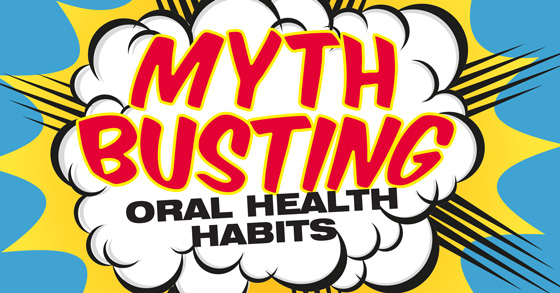We’ve all got habits, good and bad, and when it comes to our oral health, we’re no different. But, how do you know when these habits are doing more harm than good? Here’s Dental Hygienist, Jo Dickinson’s myth busting guide of some of our more common habits.
Myth #1 – Biting your nails can’t damage your teeth
FALSE
Although the chewing of nails can’t cause any direct wear to the enamel, as the nail is much softer than the enamel, a study by the American Academy of General Dentistry did find a link suggesting that nail and pen chewers were at a higher risk of developing bruxism. Bruxism is the perpetual habit of grinding teeth which can eventually lead to tooth wear. It must also be noted that nail chewers are at risk of bacterial transfer from mouth to hand and vice versa leaving themselves at risk of tummy upsets and infected nailbeds.
Myth #2 – Scrubbing your teeth when brushing causes damage to teeth and gums
TRUE
This is a common problem that seems to stem, for some of us, from our childhood when toothbrushing was encouraged to be a vigorous scrubbing action. Poor toothbrushing techniques have been reinforced by film and TV adverts, leaving many of us confused how to brush effectively. Scrubbing, we now know is harmful to teeth as it can cause enamel wear, gum recession and tooth sensitivity, plus it isn’t the most effective means of removing plaque. To demystify the best toothbrushing technique and avoid tooth wear, book a session with your dental hygienist who can help.
Myth #3 – Sipping drinks is better for your teeth
FALSE
This one might surprise you… chugging or gulping a drink down is much better for your teeth than sipping! As most beverages are either high in sugar or acid, the constant bathing of teeth can have devastating effects. Even so called ‘healthy drinks,’ such as fruit smoothies, herbal teas and flavoured waters, can contain high levels of tooth destroying acid and/or sugar. It can take up to an hour for the mouth to recover after each sip of a sugary drink so frequent sipping can initiate tooth decay pretty quickly.
There are surprisingly few tooth-friendly drinks because, as a nation, we have become so used to drinks being sweet. This concern is something echoed by the Government’s plan to tax high sugar drinks. Although many in the dental and medical profession feel this doesn’t go far enough, on a personal level, I believe that if we can’t opt for tooth-friendly drinks such as still water, milk or sugar-less tea and coffee, then glugging down our drinks might be the next best option!
Myth #4 – It’s best to use a ‘sawing’ motion when flossing
FALSE
There is a wonderful tale that dental hygienists love to tell their patients. It’s a true story of how a prison inmate managed to saw through the bars of his prison cell with dental floss. He spent each evening sawing away with his floss until he eventually eroded through the bars! Thankfully he was caught but it does show how strong floss can be. Even though tooth enamel is tough; it too can be worn down by a vigorous sawing action.
If you have been advised to floss by a dental professional, then the technique you use should be a gentle but assertive wiping action around the contour of the side of the tooth without friction or heat being generated. If in doubt, ask your hygienist or dentist to demonstrate a good technique to you. Many people are finding more effective methods to replace floss such as interdental brushes or bottle brushes. These are also technique sensitive and your dental team will be happy to advise you.
Myth #5 – Chewing gum is good for your teeth
TRUE
This habit that is very good for teeth!
The action of chewing stimulates so much saliva, it can counteract, to some extent, the harmful effect of sugar on our teeth. The chewing needs to take place almost immediately after eating sugar – a few days later just doesn’t work! It’s best to chew sugar-free gum and there are also some chewing gums that contain xylitol which has a mild anti-decay property to it. It’s probably not necessary for us to chew gum after meal times, as our teeth generally cope with what we eat during mealtimes, however chewing gum is useful for those who snack and graze on carbohydrates throughout the day and for those of us who can’t resist the odd sweet on long car journeys.
So, whether you’re a floss ‘sawer’ or a nail biter, I hope these myth busting tips have given you some food for thought on looking after your oral health and kicking some of your bad habits.
[mc4wp_form]
